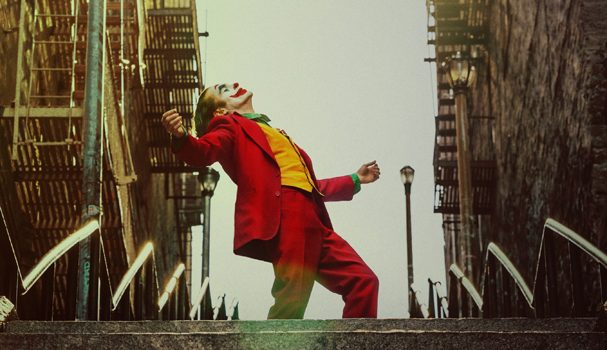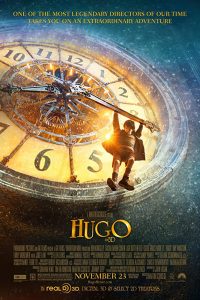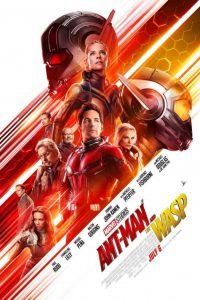Great Clown Pagliacci Is in Town Tonight: Arley Sorg and Josh Pearce Discuss Joker
 Simply put, Joker is the story of Arthur Fleck (Joaquin Phoenix) and his transition from sadsack to supervillain.
Simply put, Joker is the story of Arthur Fleck (Joaquin Phoenix) and his transition from sadsack to supervillain.
Josh: Need we say more? Everyone already knows the gist of the Joker.
Arley: It’s important for people to know that this is not a Batman movie. You should not expect supervillain fights.
The film mostly delivers on what’s promised in the trailers: a one-man show about a violent clown. With striking cinematography, a 1981 setting (and associated retro aesthetic), and a near-perfect soundtrack, it’s clear from the get-go, even from the opening title fonts, that this is not the typical superhero fare that’s been offered to audiences in past decades. And while recent movies based on DC properties have embraced their dark side – from Tim Burton’s double offering, to Christopher Nolan’s Dark Knight trilogy, to Suicide Squad, “Snyder-verse,” and beyond – Joker takes fans to new depths as one of DC’s few R-rated, live-action feature films.
Josh: Apart from this, there’s just Vertigo (Constantine and V for Vendetta) and Watchmen, from what I can tell.
Arley: Obligatory note to say I have grumpy feelings about how they mess with the Batman narrative.
Josh: I view it as a completely separate, siloed movie in the DC universe. I mean, sure, there are definite Easter Eggs — such as the social worker’s nametag and the Bat-pole in the gazebo —
Arley: The iconic [redacted for spoilers] scene!
Josh: — but the chronology removes it from any previous iterations and makes any direct sequel logistically difficult. This should be fine as a standalone.
Arley: I wish they hadn’t even put the Wayne family in the film. That brings it too close to the Batverse standard narratives and reduces the possibility of Joker as its own thing. It’s like – “what if Joker were real” otherwise.
If one wasn’t told that Joker takes place in a comic book setting, they wouldn’t have any basis for classifying it as speculative fiction (and then why would Locus review it?). There are no aliens, mutants, spaceships, or robots. It is psychological drama through and through.
Joker, the most iconic Batman villain, has gone through numerous, memorable on-screen incarnations: Cesar Romero in the original television series; Jack Nicholson in the pale moonlight; Heath Ledger’s Oscar-winning performance; and the questionable decisions that went into creating Jared Leto’s version. (Not to discount Mark Hamill and Zach Galifianakis’s voice acting.) Along comes Joaquin Phoenix, bringing the Joker back closer to the classic comic book look and grounding the character in, if not a realistic representation of mental illness, then at least a believable one.
Joaquin Phoenix renders an excellent performance, with an impressively emotional (silent) opening and captivating highlights throughout the film. He makes for an instinctively obvious choice for this role, much in the same way that Nicholson did, but that Heath Ledger didn’t really (although Ledger turned out to be phenomenal in it). Phoenix has previous film credits playing disturbed and/or disturbing (for example, his skin-crawlingly creepy Emperor Commodus in Gladiator; a PTSD-addled, violent veteran in You Were Never Really Here). His real-life appearance on Letterman — in character, to promote a mockumentary — echoes several uncomfortable Joker scenes involving a talk-show host. His facial structure, with pointed chin and a wide-stretched smile, already resembles a joker mask, even without clown makeup. He is able to switch between juvenile speech, infantile behavior, uncontrollable laughter, and confidence around women all within the same scene. The other characters don’t know what to expect from him at any one moment, and neither does the audience.
Arley: I never really followed Joaquin Phoenix before this, so I didn’t have any preconceptions about his role.
Josh: The first time I really realized that he could play crazy was in The Master. He’s like a completely different person. Before that he was Johnny Cash and played in a couple M. Night Shyamalan movies. But now, someone says, “Joaquin Phoenix is the Joker,” and I go, “Yup. Makes sense.”
Arley: The scene where he’s watching stand-up and laughing at exactly the wrong moments is such a good moment. It conveys so much about him with just a few reactions. I also really liked when he crawled into the fridge. I couldn’t tell you why that scene makes any sense to the story, but it just works.
Josh: He and Ledger used similar body language for their Jokers. In the beginning scene, Phoenix is chasing someone while wearing clown shoes, so he’s got this goofy, clomping stride. But then later in the movie he runs down a corridor in regular shoes, but he still has the same high-stepping stride. As though he’s always in clown shoes. Heath Ledger has kind of a similar long-legged, limbs flailing everywhere fight scene.
Arley: That’s all straight out of the comics. The artists convey it really well on paper.
Josh: And his dancing. It was used in so many ways, at emotionally different parts of the movie. Really externalized what was going on in Arthur Fleck’s mind.
Arley: When he had his shirt off and you could see just how thin he was — that was crazy. He dropped so much weight for the role. It reminded me of Christian Bale in The Machinist.
Apart from the initial heavy-handed setting up of the dismal conditions of Gotham (just one thing after another, which makes Joker feel like a longer movie than it really is), there are a lot of moments to recommend the film. All the performances, set design, and costumes — there are also solid writing and directing techniques, with some really bright shining shots that come as a surprise, given that director Todd Phillips is best known for The Hangover films. While financially successful, those are not widely considered to be artistic masterpieces.
Josh: There are obvious parallels between Joker and Fight Club with the mental illness theme and focus on hapless men. But the movie I think Joker most closely resembles is Taxi Driver. The aesthetics and setting, basic story arc, unstable main character, Robert De Niro.
Arley: I was thinking of Falling Down with Michael Douglas. An ordinary man gets kicked until he reaches the breaking point. It’s not a trope I particularly like, but that wasn’t enough to take me out of this movie. There were times I thought the piling on was over the top.
Josh: You can sympathize with Arthur to a degree, but I didn’t know how they were going to complete his arc from pathetic to powerful in a satisfactory way. But they did! Oh man, those stairs. I got exhausted just looking at them. They worked so well as a symbol of the drudgery of his life. And then to use them as a platform of triumph at the end was amazing. I knew where the movie was heading from the very beginning (and called all the “twists”), but, even knowing, I would have been so disappointed if he didn’t complete his goal, terrible as it was. I guess that’s what I mean by sympathize.
Arley: Really? You called everything?
Josh: Yes.
Arley: Some things actually surprised me, which is rare. I loved the way they used delusions — there was even one that I could really relate to. Other aspects were just magnificent but I don’t want to get spoilery about this in particular.
Josh: Joker was also supposed to become some kind of incel rallying point, though it looks like that didn’t amount to anything. There was some controversy about the violence. Do you think it’s irresponsible to make and release a violent movie like this?
Arley: I don’t think so, and I didn’t think it was all that violent. Some of the violence was abrupt, which makes it shocking, but not over the top. And there are way more violent movies that are recent, so I don’t know why Joker specifically was singled out.
Josh: Once Upon a Time in Hollywood is a good example. When the typical Quentin Tarantino orgy of violence revved up I thought, “Is it really necessary to watch Brad Pitt smash this woman’s face into a fireplace mantle over and over?” He was just reveling in it.
Arley: I didn’t watch it, because Tarantino is racist and a misogynist. In Joker, the violence makes sense, it follows from the plot and the character. I think they actually kind of pared it back. They deliberately didn’t show the violence against women. Almost all of those moments are off screen or implied. And the violence lends to the Batman narrative. I couldn’t help but think about the moments when Batman says that the Joker is crazy or out of his mind and people say, “Oh he’s good inside, we have to help him,” but Batman says, “You don’t know what you’re talking about.”
Josh: Speaking of the Batman narrative, what do you think of Thomas Wayne as the bad guy?
Arley: I think it’s cool. It makes the Batman story more interesting because he idolizes his dad and doesn’t have any idea of what a dick he really is.
Josh: I think it’s more realistic, because fuck the rich, but I was a little disappointed by it. Maybe because Thomas Wayne was such a force for good in previous Batman stories and there didn’t really seem to be any need to tear him down from that.
Arley: This movie casts all the rich and powerful as bad guys. If it’s a class conflict statement or just an accidental result of being in a comic book universe, I can’t say.
Joker pulls reference from a wide range of films outside of the Batman genre, including The King of Comedy and several other Scorsese pictures. Within Joker, Charlie Chaplin’s slapstick and scenes from Modern Times further the theme of a clown/trickster who snaps under the pressures of society. Fleck inadvertently finds himself the face of an anti-rich protest movement that turns violent, and at times it is difficult to decide who is the bad guy, who is the victim, and who is getting exactly what they deserve.
Josh: There are some moments of great tension. The scene deciding Gary’s fate was so harrowing, but mixed with some kind of fucked up physical comedy. People in the audience at the showing I saw were so tense the whole time that they were latching on to any chance to laugh. I heard nervous chuckles, like, “Can I laugh at this?” And also, “How much can I sympathize with him?” And that’s for the audience to decide.
Arley: That’s gotta be deliberate writing. I feel like there’s a game or test being played with the audience of, “How much of this will you accept?”
Josh: It feels like a trap. There are some amazing visual parts I would really like to see again, but I don’t really want to go through the whole ordeal of rewatching the entire thing anytime soon, just to enjoy those brief moments. It took a while to think about this movie. I’m still not too sure how I feel about it.
Arley: I feel the way you do: it ranges from really good to great in some aspects, but I still don’t know if I liked it, or if I would consider it a “good movie.” People ask me if it’s a good movie and I had to stop and think about it. It’s well made but I don’t know what you’d consider good. One last thing, would we recommend it?
Josh: I would recommend it to certain people. I know friends who definitely would not like it, and friends who would. Do you like fucked up psychological shit? Okay then. My wife did not agree with what seemed to be a message justifying his violence by way of mental illness or because he was being bullied.
Arley: That nagged at me throughout the movie. It’s a bad, old-timey trope to say the bad guy is bad because he’s “crazy.” It’s similar to typing serial killers and similar as gay or trans – I think at heart leaning on a collective and outdated fear of “crazy people.” But I just feel out of my depth on making a strong statement about it with this movie. I mean, the Joker is depicted as insane; and sometimes serial killers (and so on) are actually insane.
The message in Joker is difficult to parse, with many things left deliberately vague. Fleck’s first kill could arguably be called self-defense, but everything after that certainly is not. The rich act in their own interest, even as the city’s infrastructure decays all around the lower classes, but gunning them down in the street doesn’t actually offer any civic solutions. As for the state of mental health care in Gotham, historically, all classic Batman villains (Joker, Riddler, Penguin, etc.) are written off as crazy — they go to Arkham Asylum, not jail, and therefore they are not ever legally responsible for their actions.
The film also doesn’t seem to do much of anything new, other than showcase Phoenix’s stunning acting talents, as well as capture a few amazing shots – credit to a talented cinematographer, no doubt. Maybe if this were to become the first in a series reimagining the occupants of Arkham and how they wound up incarcerated there, Joker would have a point to all its madness.
Otherwise, perhaps the most anyone can get out of it, the way Arthur Fleck does, is: That’s life.
Directed by: Todd Phillips
Written by: Todd Phillips & Scott Silver, based on characters created by Bob Kane, Bill Finger & Jerry Robinson
Starring: basically Joaquin Phoenix, but also Robert De Niro, Zazie Beetz, Frances Conroy, Brett Cullen, Shea Whigham, Bill Camp, Glenn Fleshler, Leigh Gill, Josh Pais, Rocco Luna, Marc Maron, Sondra James, Murphy Guyer, Douglas Hodge & Dante Pereira-Olson as Bruce Wayne
With a soundtrack that includes: “Everybody Plays the Fool“, “If You’re Happy and You Know It“, “Send in the Clowns“, “My Name Is Carnival“, “Smile“, “That’s Life“, “White Room“, and more

JOSH PEARCE, Assistant Editor, started working at Locus in 2016. He studied creative writing at SFSU and has sold short stories and poems to a variety of speculative fiction magazines. Born and raised in the Bay Area, he currently lives in the East Bay with his wife and son and spends way too much time on Twitter: @fictionaljosh. One time, Ken Jennings signed his chest.
ARLEY SORG, Associate Editor, grew up in England, Hawaii, and Colorado. He studied Asian Religions at Pitzer College. He lives in Oakland, and usually writes in local coffee shops. A 2014 Odyssey Writing Workshop graduate, he is soldering together a novel, has thrown a few short stories into orbit, and hopes to launch more.
 While you are here, please take a moment to support Locus with a one-time or recurring donation. We rely on reader donations to keep the magazine and site going, and would like to keep the site paywall free, but WE NEED YOUR FINANCIAL SUPPORT to continue quality coverage of the science fiction and fantasy field.
While you are here, please take a moment to support Locus with a one-time or recurring donation. We rely on reader donations to keep the magazine and site going, and would like to keep the site paywall free, but WE NEED YOUR FINANCIAL SUPPORT to continue quality coverage of the science fiction and fantasy field.
©Locus Magazine. Copyrighted material may not be republished without permission of LSFF.








